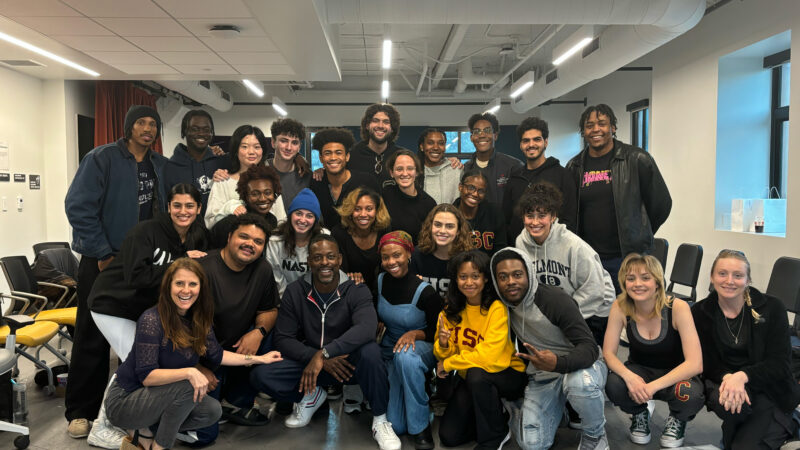“If you know what your ‘why’ is, the ‘how’ is secondary to that. If you know your why, I feel like that is what’s going to sustain you.” That’s the powerful message that actor Sterling K. Brown (This Is Us, The People v. O.J. Simpson, American Fiction) shared to students on a recent visit to the USC School of Dramatic Arts. Brown, known for his iconic performances in television and film, is the recipient of three Primetime Emmy Awards and a Golden Globe Award, as well as an Academy Award nomination for his work in 2023’s American Fiction.
In a classroom with his friend and former classmate, SDA professor Mia Barron, Brown answered myriad questions from students about his career and experience as an actor, focused largely on the transition from college to the real world. Speaking mostly to students from the School’s MFA in Acting program, Brown, who also graduated from an MFA program, had plenty of advice to share.
“Do something. Whether you’re reading something, whether you’re getting together with classmates and you guys are working on something together—you have to learn how to be internally motivated,” he said.
He shared stories about his own early-career days acting in New York, explaining that after his graduation, he moved into a small apartment in Harlem with no air conditioning. While his apartment then may have lacked luxury, Brown only felt thrilled to finally be supporting himself through acting.
“I would ride the bus up and down 125th for AC. But it cost $85 a week, and your boy was clearing $215, and you couldn’t tell me nothing,” he laughed. “I felt like Rockefeller. I was just so happy to be doing it.”
The internal ‘yes’
In addition to practical advice, students asked Brown to share his personal experience on sets, as well as some of his ideas about acting, mental health and spirituality. Brown was open and generous, answering student questions with humor and candor.
Brown explained that, for him, acting is a way to feel more connected and less judgmental about his fellow humans. Each character, he said, was someone that he came to understand deeply by the time he had finished playing the role.
“I find that with each character, consciously or unconsciously, I get to release a little judgment that I may have had—because you can’t judge someone and play them at the same time,” he said. “And after I finish playing them, I can love them more fully.”
He also addressed questions from students ranging from how to choose projects to audition for, how to stay calm and collected during the audition process, and how to deliver excellent performances in television, where the rehearsal process is often limited or nonexistent. He gave book recommendations (especially recommending The Power of Intention by Dr. Wayne Dyer) and told anecdotes about working on sets throughout his career. He also delved into difficult and painful topics, like coping with rejection early in a young actor’s career.
“Give yourself a tremendous amount of grace, because you’ll need it,” he said. “It’s a hard business. Your internal ‘yes’ needs to be louder than those external ‘noes’.”
He encouraged students to continue believing in themselves and putting in the work, which would slowly build to connections within the industry, rather than hoping for overnight success.
“If you continue to do work, you will make fans—out of casting directors, out of people who have agency in your career,” he said. “Don’t be discouraged.”
Enough for everybody
Brown wasn’t the only one giving advice and sharing their experience during the session. Professor Mia Barron, a longtime friend of Brown, chimed in with a number of tips and stories for students transitioning from an academic program into the world of professional acting. She shared her own stories of coping with the early days of an acting career, particularly taking care to preserve one’s mental health and wellbeing.
“I had to investigate how to keep pursuing work and keep myself alive and feeling creative without tension and anxiety,” Professor Barron said.
Brown and Barron recommended keeping close with classmates and supporting each other—to view fellow classmates as members of a support network rather than as competition in a famously cutthroat profession.
“You’re each other’s support, so you want to take care of yourself and your group,” Professor Barron said.
Brown agreed.
“I do not believe in the law of scarcity,” he said. “I believe there’s enough for everybody to eat.”
Most of all, Brown encouraged students to remember why they wanted to pursue a career in acting in the first place. He advised them to—to the best of their ability—look at the auditions ahead of them as opportunities to do the thing they love and share it with others, and to look at initial rejections or failures as just one part of the journey to later success.
“Failure is part of the process,” Brown said. “The sooner you can embrace that and make peace with it, the better.”
Brown advised students to look at the big picture and to find their own internal motivations, not basing their self-worth on the latest feedback from a casting director or agent. He told them to embrace failure as learning opportunities and as something that would only help them grow and get better. “Okay, I failed. Cool,” he said. “Let’s see how I can fail again—until I don’t.”
